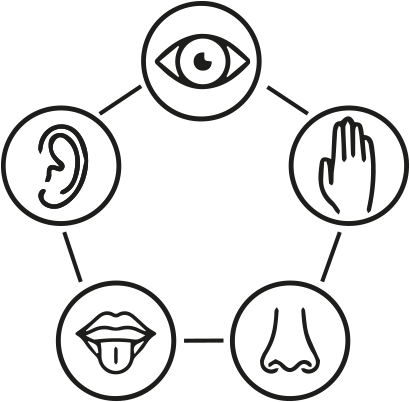Instructions: select a sense (or several) and/or learning goal(s), press submit and get inspired with some educational examples tailored to your request!
Walking with(out) senses
Students learn how and which sensory information is used in controlling human walking.
Led by Chris McCrum & Hans Savelberg
Observing as a professional
Students learn to observe in their field of knowledge through different observations questions from other fields of knowledge.
Led by Ilse van Lieshout
Using paint
Students learn to reflect with a certain learning topic and outcome. They gain personal insight and abilities for creativity, awareness and well-being.
By Ilse van Lieshout
Mapping one’s own perceivings
Students get acquainted with sensory knowledge and their sensory awareness in the surrounding they are in.
Led by Ilse van Lieshout
Clay sculpting
Students learn to get acquainted with their sensory perceivings through touching clay.
Led by Ilse van Lieshout
Alina’s work
By Alina Triebner
Final work by Malo & Nathanial
By Malo Hedouin and Nathanial Gabbidon Elective Text – Microcosm of Senses
Senses-based Learning Symposium 2024
Programme: Keynote speech: “The effects of senses on learning and the moderating impact of technology” by Wim Gijselaers and Therese Grohnert Student presentation: artistic tropical biology by Nubia Thierfelder and Roy Erkens Workshop: “Do you know your own sensory health?” & “On the effects of sensory learning” by Andrea Smitten “Senses-based learning and Marres” by…
Senses-based Learning Symposium 2023
Senses-based Learning Symposium 2023 – Programme
Who Nose?
Training the sense of smell – How can smell help address different challenges? How might the use smell to inform investigation, and maybe even make it part of the intervention?
Led by Anna Harris
Diary Notations
Template researching Lived Experience, by Phenomenological (self) observation
Led by Ike Kampfhof
Teaching Sensory Anthropology
Have an understanding of how sensory awareness is put into practice by researchers in order to solve challenges of presentation and representation.
Led by Paula Serafini
Sounding Bodies
To compare musical instruments and the body as an instrument;
What if the body does not function well enough to train the instrument, the instrument needs specific care, or different ways of playing it can affect the sounds of the instrument? What if we take the body itself as an instrument, tune it, and join it with other bodies?
Led by Genevieve Murphy and Aart Strootman
Operation Mango
You will gain insight into a series of surgical practices by using fruits to simulate surgeries as well as learn how these procedures are carried out from start to finish using surgical tools such as scalpels.
Led by Anna Harris, Kaisu Koski and Bart Schrier
Analysing Media – Introduction to phenomenology as a research method
Learn to pay careful attention to your prereflective experience. In relation to specific structures in media
For analysing and discussing what this means for our mediated relation to the world, you need theoretical concepts.
Led by Ike Kamphof
Introduction to our podcasts
Members of the team share their experience in the Sister’s Hope Home
Sister’s Hope Home – Part 1
Members of the team share their experience in the Sister’s Hope Home
Sister’s Hope Home – Part 2
Members of the team share their experience in the Sister’s Hope Home
Sister’s Hope Home – Part 3
Members of the team share their experience in the Sister’s Hope Home
Sister’s Hope Home – Part 4
Members of the team share their experience in the Sister’s Hope Home
Sister’s Hope Home – Part 5
Members of the team share their experience in the Sister’s Hope Home
Sister’s Hope Home – Part 6
Members of the team share their experience in the Sister’s Hope Home
Sounding Media: Designers and Users
The course deepens the understanding of the field of sound studies already acquired in the module Sound Technologies and Cultural Practices. Where the Sound Technologies module focused on musical practices, the focus of this course will be sounds of a non-musical nature.
Led by: Dr. Alexandra Supper
Observing and representing: The history of the senses
Becoming aware of the complexity, multi-dimensionality and diversity of sensory experiences.
Led by: Dr. Alexandra Supper (DSS, coordinator)
Dr. Anna Harris (DSS), Dr. Annelies Jacobs (DSS), Dr. Jack Post (LK),
Dr. Jo Wachelder (History)
Sensory Studies of Science
In this course, we will explore the role of the senses and embodied practices in a variety of scientific disciplines and different sites of knowledge-production, and encounter the method of sensory ethnography as a tool to study the senses in the sciences.
Led by: Dr. Alexandra Supper
Exploring Senses Cards
In this student Premium project ‘Exploring senses’ students created cards and a training manual for sensory education. Premium Project are interfaculty students collaborations.
Sensory maps
Examples of student produced sensory maps
Senses and Evaluation – PART 1 – LARP Experiment
A student’s perspective on LARP Experiment.
Podcast by: Marjorie Platero Martinez (honour’s student)
Senses and Evaluation – PART 2 – How to evaluate sensory education/skills?
A student’s perspective on how to evaluate sensory education/skills.
Podcast by: Marjorie Platero Martinez (honour’s student)
Podcast – teacher
Coming soon
